June 6 is a national holiday in Korea, when people (are supposed to) pause and reflect about the sacrifices made during the 6-25 War, as it is usually called here. Of course, June 25 is the day in 1950 when Kim Il-Sung’s soldiers, with Soviet and Chinese blessing, crossed the 38th parallel and fomented a bloody three-year conflict. He was darn near successful, but the South Koreans had allies of their own—the Americans, the Brits, the Canadians, the Turks, the Aussies, the Filipinos, the Kiwis, et al.—and essentially restored the border. So it has remained for 6 1/2 decades.
Every year, without fail
I visit Seoul National Cemetery every June 6, and this year was no different. Please come with me as I recount today’s events. I got on the Seoul subway and took Line 2 west to Line 4, then north to Dongjak Station. En route, I met an older gentleman in military attire with medals aplenty. He informed me that he had been part of the ROK’s “Vietnam Expedition.” We were going to the same place. I came out at 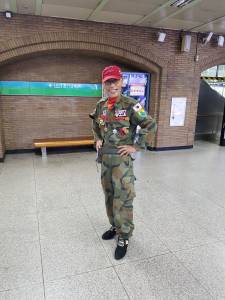 the entrance of the cemetery, established by presidential decree in 1955. About 1.4 million square meters, it is the resting place of 165,000 soldiers and others who died or fought in the war, along with some other notables. In the shadow of Gwanak Mountain, it overlooks the Han River and is a scene of considerable majesty. I bought two bouquets of flowers and walked on in.
the entrance of the cemetery, established by presidential decree in 1955. About 1.4 million square meters, it is the resting place of 165,000 soldiers and others who died or fought in the war, along with some other notables. In the shadow of Gwanak Mountain, it overlooks the Han River and is a scene of considerable majesty. I bought two bouquets of flowers and walked on in.
Soon my right-wing friend Yong Yoon arrived. After pausing at the main event where President Moon Jae-In spoke, we began a fairly long walk through the eastern and northern parts of the cemetery. Mr. Yoon and I finally came to the grave of Park Chung-Hee, the man who ruled South Korea from 1961 until his assassination in 1979. Park was admired by some (he engineered the country’s economic recovery) and reviled by others (he took power at the point of a gun and subverted democracy), and quite a few people felt both ways about him. Mr. Yoon, I tell you, is a Park devotee. He was the second of several speakers during a ceremony at the foot of the grave. While there, I posed with him and 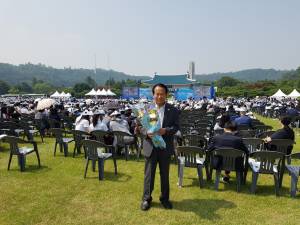 numerous others. I had brought a Taegukgi (the Korean flag) with me, and the people took note.
numerous others. I had brought a Taegukgi (the Korean flag) with me, and the people took note.
As mentioned earlier, I visit Seoul National Cemetery every June 6. Never before have I seen another foreigner at these gatherings, and I look. Each year it’s just me, although I cannot claim to have seen every person there. This time, however, I saw a handful. Still, non-Koreans are so rare as to be oddities. People appreciate foreigners, most especially Americans. They know what we did during the Korean War and continue to do to maintain the peace.
Kim Tae-Seon and Kim Hyun-Suk
Mr. Yoon, who had other obligations, was required to stay. But since there were two more graves I had to see, we parted. With help from some young volunteers, I made my way to a four-story charnel house 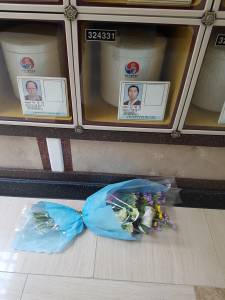 called Chunghondang. I had a name (Kim Tae-Seon) and serial number (324331) which had been provided by Kim’s granddaughter, Paek Bomin. She is my former student, now sailing toward a Ph.D. at the University of Northern Colorado. Born in 1926 in what would later be called North Korea, Kim died in 1988. A patriotic man, he did his part in the war effort; I do not know the specifics other than that his service began in 1951 and ended in 1953. I went up to the third floor of the building and located the glass-covered box that holds his remains. I laid one of the bouquets there and quietly paid my respects.
called Chunghondang. I had a name (Kim Tae-Seon) and serial number (324331) which had been provided by Kim’s granddaughter, Paek Bomin. She is my former student, now sailing toward a Ph.D. at the University of Northern Colorado. Born in 1926 in what would later be called North Korea, Kim died in 1988. A patriotic man, he did his part in the war effort; I do not know the specifics other than that his service began in 1951 and ended in 1953. I went up to the third floor of the building and located the glass-covered box that holds his remains. I laid one of the bouquets there and quietly paid my respects.
I departed Chunghondang, tossed a handful of incense in a large burner and approached another set of young volunteers. How, I asked, do I find the grave of Kim Hyun-Suk (1915−1981)? I only knew that it was in section 17. Fortunately, that was close. One of the volunteers came with me and helped me locate her grave, where I laid the other bouquet. Kim was a fascinating person, 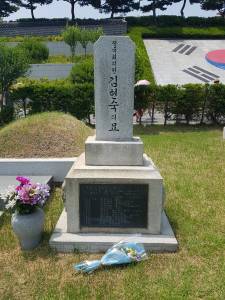 in my view. As the war raged on, she sought to take a more active role than what was ordained for women at the time. She formed an all-female brigade, with the grudging permission of President Syngman Rhee and most of the military brass. Although they marched, trained and learned to shoot guns, they did not actually engage in combat. These hardy women conducted intelligence work around the hotbed that was Jiri Mountain. After the war, Kim, who rose to the rank of colonel, was awarded a Medal of Merit by President Dwight Eisenhower. Her brigade lasted until 1960.
in my view. As the war raged on, she sought to take a more active role than what was ordained for women at the time. She formed an all-female brigade, with the grudging permission of President Syngman Rhee and most of the military brass. Although they marched, trained and learned to shoot guns, they did not actually engage in combat. These hardy women conducted intelligence work around the hotbed that was Jiri Mountain. After the war, Kim, who rose to the rank of colonel, was awarded a Medal of Merit by President Dwight Eisenhower. Her brigade lasted until 1960.
Babies—we need babies
Korean women are exempt from military service, whereas all able-bodied men must serve two years. Such a policy obviously puts men at a disadvantage in terms of education and career in this very competitive society. A crude generalization is that the guys feel resentment, but the girls like the status quo just fine. “We have babies,” they say. Not very many, I say. The current rate of births per woman is 1.05, and 2.1 is necessary for a country to maintain a stable population. The Korean demographic time-bomb is ticking, louder all the time! (Japan and Taiwan, for what it’s worth, are in similar straits.) As much as I dislike the ROK’s neo-sexist military policy, I would be amenable if the women were in fact producing enough kids. I wonder what Kim Hyun-Suk would think of this matter.
It had been a hot and muggy day at Seoul National Cemetery. Lots of walking up and down hills, so a measure of effort, trouble and discomfort was required. But how much? I think, I really think about what Koreans went through in the early 1950s. Because of them, we have freedom in the southern half of the peninsula—freedom to think, speak, criticize the government, travel abroad, live our lives and so on. Those up north can only dream of such freedom.

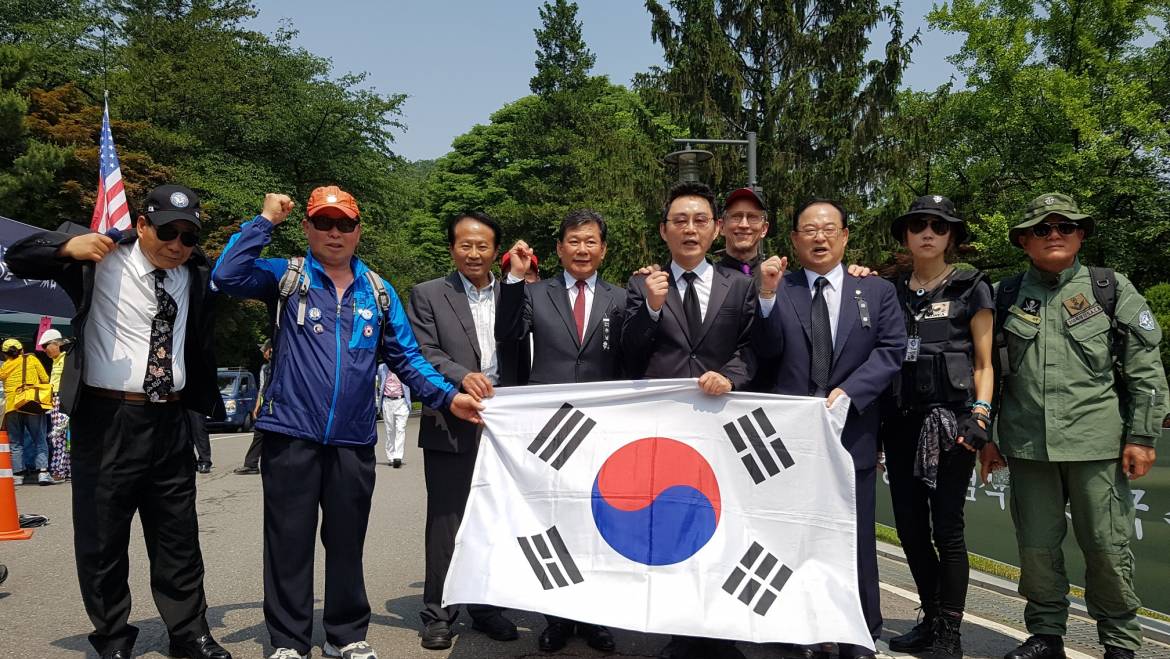
14 Comments
It is really honored that you mentioned my grand father’s story and my name in your writing. I really appreciate with your visiting and respects to my grand father. Your respects mean a lot to all of my family members. I hope we visit my grand father together soon.
Bomin, I was really happy to be able to find your grandfather ‘s vault and to lay the bouquet of flowers there. I respect him and appreciate what he did in those days. He put his life on the line. God bless Kim Tae-Seon!
Richard – a moving account, truly. Thank you for posting. See you in Seoul very soon!
Thank you, Justin. Thank you very much. I know that in your job, you get a sampling of the history and culture of many countries. For me over the last decade, it’s been Korea and little else. See you here in 11 days, I think.
I am glad you have traditions that honor Korean history. As you pointed out, no other non-Korean attends. Your message to them is clear, “I honor you and the sacrifices of your ancestors”. Your exactly right to do so. You have no other motive except to show honor. Too, the fact that you create a record with your “boots-on-the-ground” accounts is very important for spreading the word to your readers around the world. We need a similar reporting going on in other countries too.
You are right, Gary. I go there every year just to show my respect and appreciation for what those people endured and sacrificed. What I did not say in the article is that I am dismayed at how so many here pay it scant attention. This is just a day off from work, etc.
Wow. I feel ashamed as being Korean but not having attended the ceremony on the day. YES Koreans we should honor and look up to those who sacrificed themselves to keep the peace in this country (though i wish it has never happened) TRUELY appreciate your thoughts and care on Our country. Your interest and effort on korean history and even posting it on site as the amazing article always astonish me. Please keep on posting !
Anita, there is no need for you to feel shame. I know you are a proud Korean woman who knows her history.
I read your “Memorial Day at Seoul National Cemetery.” I was touched by your art of writing. It is a poet, it is superb. As I read your article I am with you whereever you are. I cannot stop reading them because I am a part of you. I feel like I am writing the articles with you. Excellent job! I think Korean Government needs a person like you to intruduce Korea to the world.
Mr. Yoon, the honor was mine to accompany you on Wednesday. You lived through the Korean War and its aftermath.
WOW this is the first time I write some comments on your website!
I’ve also been there last week with my whole family for my uncle who passed away in vietnam war. As I visited every year, this place made me think a lot.
As u know, u can see countless tombstones there who dedicated for our freedom and peace. Those remind me how precious our peace were made.
My gradma always missed my uncle(he died his age of 18) and I think her tear told me everything to me that we do have a responsibilty to keep our Peace.
Thank you for your writing Richard!
Kimmy, thanks for reading this story and for your comments thereon. Too bad we missed you at Seoul National Cemetery!
Like Korea, we just celebrated our 120th Independence. My salute to all who laid their lives in d name of freedom.
Let us keep the passion and dedication to stand and work for the preservation of our freedom and democracy in our own little way, this is one of the greatest gift we can give to our nation and our people and the coming generations, as part of our legacy and heritage beyond ages.
GOD BLESS YOU RICH for remembering these people.
Oh yes, let’s take a moment to congratulate the Filipinos for shaking off the chains the Spaniards had on them for 250 years. I respect all of you very much.
Add Comment